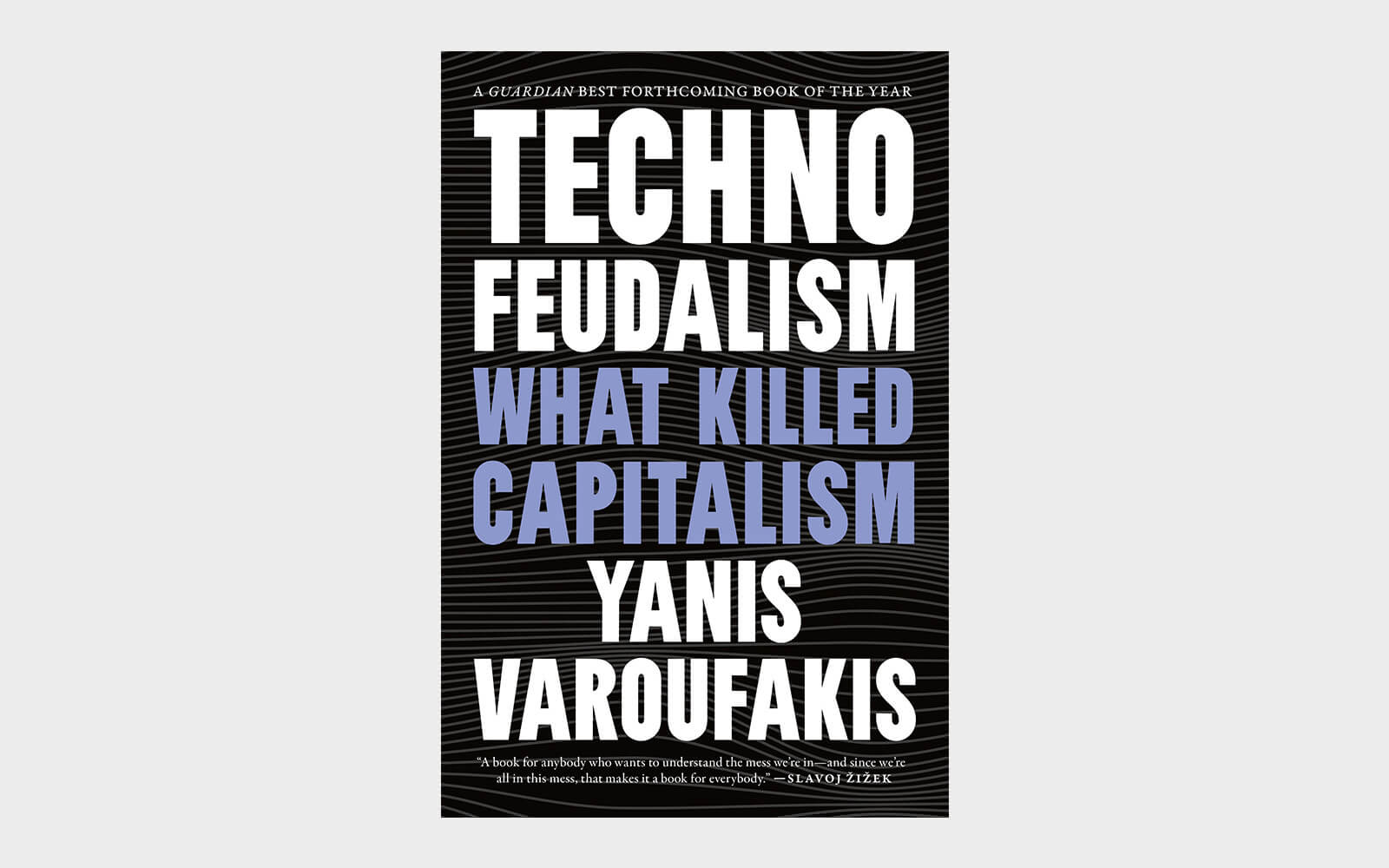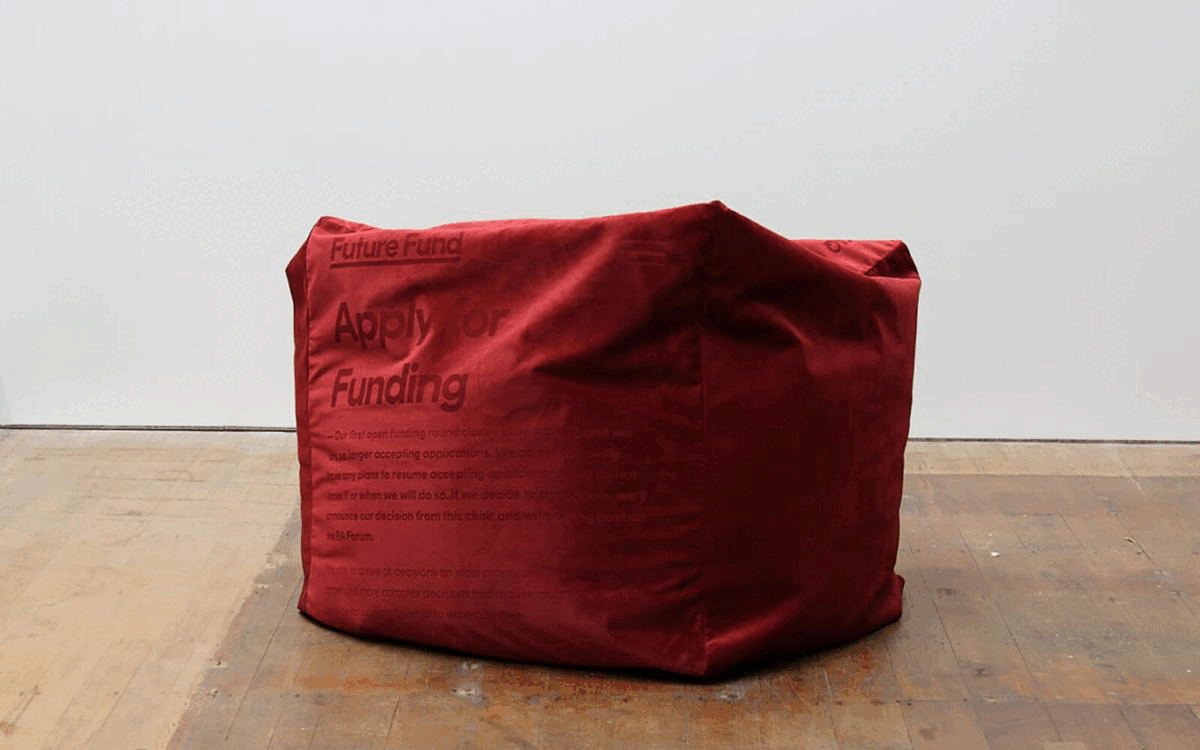1,577 days, 2,409 entries ...
Newsticker, link list, time machine: HOLO.mg/stream logs emerging trajectories in art, science, technology, and culture––every day
“Universal / Remote,” a show chronicling how “capital and data flow freely on a global scale,” opens at the National Art Center Tokyo (NACT). Artists including Xu Bing, Maiko Jinushi, Trevor Paglen, and Evan Roth contribute works addressing globalization and social atomization. Hito Steyerl, Giorgi Gago Gagoshidze, and Miloš Trakilović stage their video installation Mission Accomplished: Belanciege (2019, image), a sardonic reflection on post-Berlin Wall European culture—and the luxury brand Balenciaga.

Yanis Varoufakis
Technofeudalism

“Today’s sentence should serve as a warning to other corporate insiders that insider trading—in any marketplace—will not be tolerated.”
“I think markets are fundamentally a better source of truth than media or narratives.”
“Unlike traditional artists, I think generative artists operate a lot more, structurally speaking, like musicians. When a musician releases new music, they have tour tickets, which are somewhat reasonably priced and fans can feel like they’re directly supporting the artist.”
“Waiting for the Other Shoe to Drop,” a send-up of disgraced crypto CEO Sam Bankman-Fried’s (SBF) Future Fund by Michael Stevenson, opens at Michael Lett in Auckland (NZ). The show takes aim at SBF’s defunct effective altruism charity by reproducing the text from the fund’s website on beanbag chairs—just like those beloved by the former billionaire. The New Zealand artist describes each chair (filled with shredded paper) as “a placeholder” for “good intentions and a compromised crypto ecosystem.”

“I think the Bitcoiners that are celebrating these enforcement actions tend to be later on the adoption curve and lower on the IQ spectrum than folks that actually know what’s going on. They’re cultists.”
“If TurboTax is Dark UI, Tax Heaven 3000 is Pink UI, the nightcore of tax software.”

Serendipitously coinciding with an economy on the brink, Isaac Julien’s multiscreen installation Playtime (2014, image) opens at Berlin’s PalaisPopulaire. Set during the 2008-09 financial crisis that catalyzed the Great Recession, the filmmaker experiments in visualizing the flow of capital from the perspective of seven interlinked characters (a pair of hedge fund managers, a journalist, an artist, an art dealer, an auctioneer, and a maid) whose lives and ventures span Dubai, London, and Reykjavík.

“As each patron stepped up and withdrew from the ATM, their picture was taken, ranking them based on the amount of money left in their wallet. For the opulent at Basel Miami, is was the perfect piece to feed your hubris.”
“By attempting to shield consumers from high prices, governments will only encourage consumption via lower prices, prolonging the energy crisis.”
“A premature extinction event occurs before we’ve flooded the universe with ‘value.’ We, then, shouldn’t spend money on global poverty: those resources should instead go to ensuring that we realize our ‘longterm potential.’”
“From compromised system integrity and faulty regulatory oversight, to the concentration of control in the hands of a small group of inexperienced, unsophisticated, and potentially compromised individuals, this situation is unprecedented.”
“The rumours for this blowup seem so egregious and unnecessary to me. I can’t imagine running an exchange that makes mid-8 figures per day in revenue and thinking ‘how can we leverage this for more?’”
“They’ve contributed $73 million through June 30th of this year. That’s more than the oil and gas industry has put into politics, more than defence, and more than the transportation sector.”
“We believe AI is the future of corporate management. Our appointment of Ms Tang Yu represents our commitment to truly embrace the use of AI to transform the way we operate our business, and ultimately drive future growth.”
“And that ad is not an argument for why crypto works. It’s not an argument for what it does or what problems it can solve. It’s just financial FOMO.”
“Using steganography, I have hidden the whole essay inside the JPEG. Yes, you’re looking at a conceptual artwork that is currently explaining itself to you.”
“We’re in the CompuServe age of this stuff. Like, we haven’t even gone to AOL or MySpace or, you know, even Facebook yet in terms of lineages, of how technologies develop.”
Daily discoveries at the nexus of art, science, technology, and culture: Get full access by becoming a HOLO Reader!
- Perspective: research, long-form analysis, and critical commentary
- Encounters: in-depth artist profiles and studio visits of pioneers and key innovators
- Stream: a timeline and news archive with 1,200+ entries and counting
- Edition: HOLO’s annual collector’s edition that captures the calendar year in print
